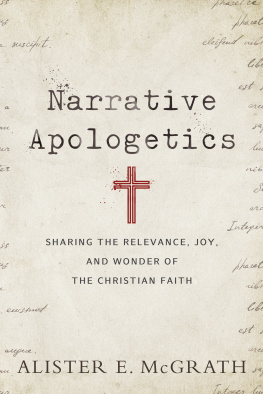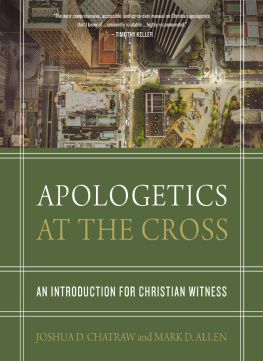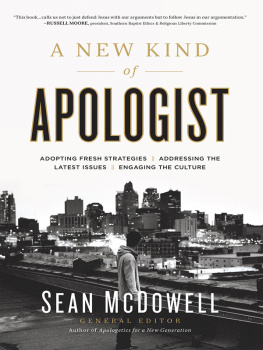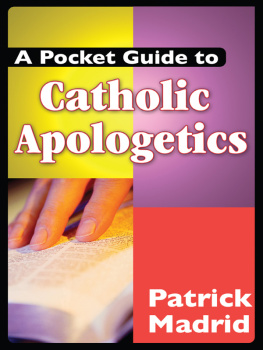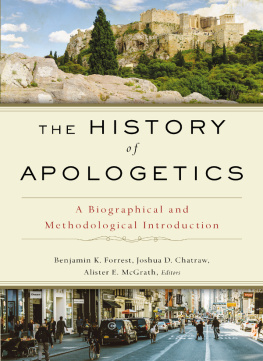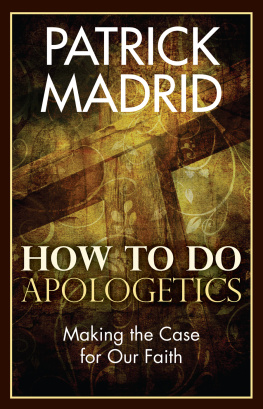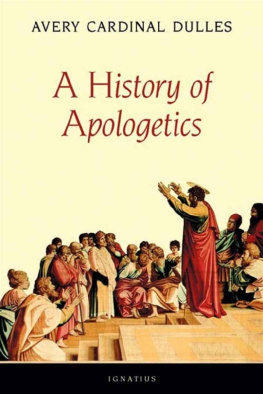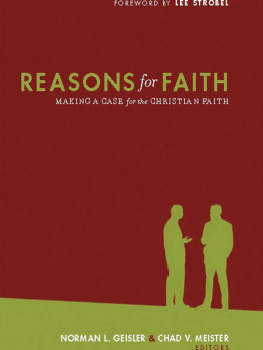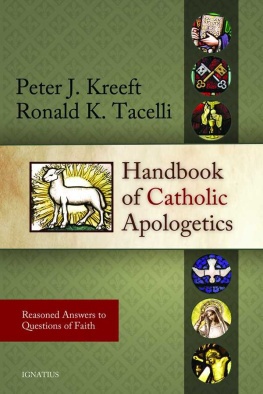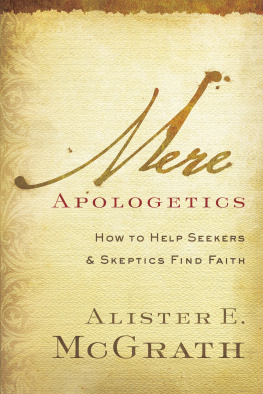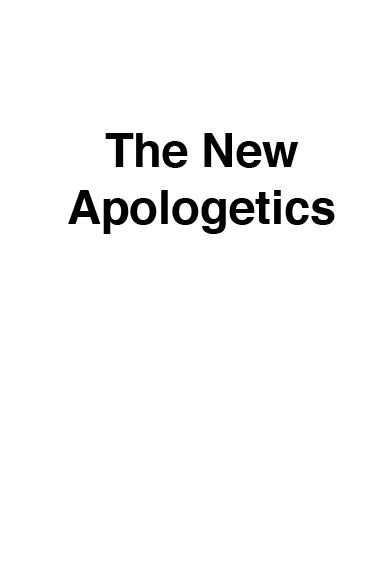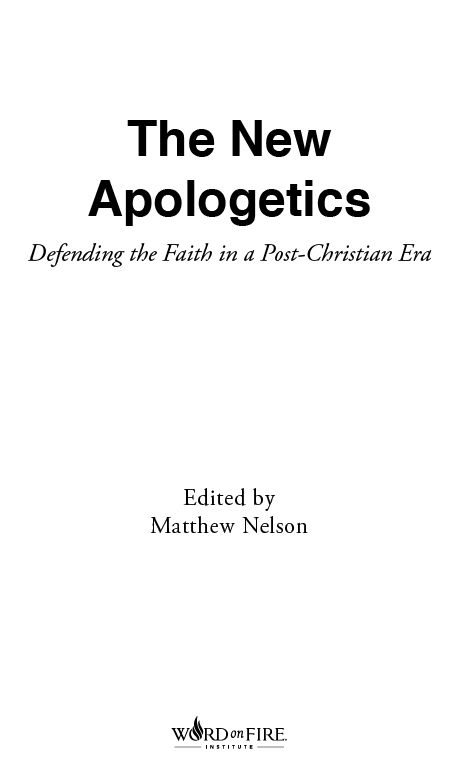Published by the Word on Fire Institute, an imprint of
Word on Fire, Park Ridge, IL 60068
2022 by Word on Fire Catholic Ministries
Printed in the United States of America
All rights reserved
Cover design, typesetting, and interior art direction by Rozann Lee and Cassie Bielak
Excerpts from the English translation of the Catechism of the Catholic Church for use in the United States of America Copyright 1994, United States Catholic Conference, Inc.Libreria Editrice Vaticana. Used by permission. English translation of the Catechism of the Catholic Church: Modifications from the Editio Typica copyright 1997, United States Conference of Catholic BishopsLibreria Editrice Vaticana.
No part of this book may be used or reproduced in any manner whatsoever without written permission, except in the case of brief quotations in critical articles or reviews. For more information, contact Word on Fire, PO Box 170, Des Plaines, IL 60016 or email
.
25 24 23 22 1 2 3 4
ISBN: 978-1-685780-04-3
Library of Congress Control Number: 2021922718
Contents
Foreword
Always be ready to make your defense to anyone who demands from you an accounting for the hope that is in you; yet do it with gentleness and reverence (1 Pet. 3:1516). This is the charter of Christian apologetics: we must be ready, and can be ready, to offer a rational accounting for our Christian life and faith, and for the hope that impels us. Our life in Christ is reasonable and not the result of mere subjective emotional enthusiasm, which comes and goes like the clouds in the sky.
Rational explanation, of course, has never been sufficient. The even more ancient classical wisdom of the art of persuasion reminds us that if we are effectively to give an account for the hope that is in us, we must first establish the bond of trust and touch the heart, thus disposing the hearer to be attentive to the reasons we offer. In an age in which scandals have shattered trust and peoples hearts are lured away by the emotionally potent distractions of our secular world, they will not pay attention to words and reas ons alone.
The early Dominicans built trust through austere, sacrificial lives that were radically different from those of the corrupt clergy of their day, and through a life of prayer and simple piety they touched the hearts of those who had deserted the Church. Then they were able to offer clear reasons for Christian hope, refuting the false ideas of their time. The stern St. Charles Borromeo and the charming St. Francis de Sales won the trust, and won the hearts, of their heretical contemporaries because of the gentleness and reverence of their saintly lives. Then their clear teaching could have an impact.
But if reason is not sufficient in itself, it is nonetheless the essential foundation of apologetics. So many people are being led away from life in Christ by specious reasoning. And our secular society is caught up in all kinds of irrational delusions about the nature of the human person and the purpose of life; these have quickly hardened into an ant i-C hristian orthodoxy that it is perilous to oppose.
The New Apologetics is a fountain of lif e-g iving clarity in a sterile secular desert, offering priceless assistance to us so that we can give a reason for the hope we have. Truth is simple, but error is complex, and the many short chapters address the complex challenges to Christian faith in these days, which require fresh thinking from the Christian apologist.
God placed our heads in such a prominent place on our bodies that surely he wants us to use them. A dumbe d-d own and mindlessly subjective faith is useless; we can rejoice in the fruitful insights offered by each of the many authors in this book, each examining one of the many facets of the modern apologetical enterprise. And each offering is blessedly brief, a lesson for us all in how to communicate, especially in a modern society of restricted attention spans. Each brief but insightful chapter invites the reader to go beyond what is offered to the feast of faith and reason to which it leads.
Cardinal Thomas Collins, Archbishop of Toronto
Acknowledgments
Matthew Nelson
From start to finish, editing this book has been a labor of love. First, thank you to the contributors of this volume. I was asked to put together my all-star team of philosophers, theologians, apologists, and evangelists for this book. Recruiting so many first-rate contributors for a single volume seemed in the beginning like a far-fetched dream. But given what a book like this could do for the Church, it was worth a shot. So, I went for it; and by Gods grace, you all said yes. Thank younot only for your contributions to this book, but for what you continue to do in your own apostolates and professions for the greater glory of Jesus Christ and his Church.
Equally, thank you to the master apologists who first showed me the incredible power of apologetics done well: Patrick Madrid, Scott Hahn, Tim Staples, Jimmy Akin, Peter Kreeft, Mark Brumley, Trent Horn, Stephanie Gray Connors, Steve Ray, Edward Feser, N.T. Wright, William Lane Craig, John Lennox, and Bishop Robert Barron. I am especially grateful to Karlo Broussard for his friendship and encouragement. You are one of the best, brother.
I owe an immeasurable amount of gratitude to my friends in the Word on Fire publishing department: Brandon Vogt, Matt Becklo, Dan Seseske, Jason Paone, Edyta McNichol, and James ONeil. Thank you for all of your hard labor and intellectual rigor that you have quietly invested into making this book into something special. I constantly marvel at your ability to make good writ ing great.
Additionally, thank you to Rozann Lee, Cassie Bielak, and the design team for making this book look and feel like gold. You have proven once again that alchem y is real.
Finally, I would like to extend my thanks to Oxford University Press for permission to reprint a revised version of The Mirror of Evil, from God and the Philosophers: The Reconciliation of Faith a nd Reason.
Introduction
Matthew Nelson
In my early twenties, I ditched Catholicism for the world. It did not take long for my religious convictions to become doubts. A few years later, after a reluctant but providential visit to the confessional, I returned home to the Catholic Church. This spiritual reversion was marked by an immediate and profound conversion of heart. But my conversion of intellect was not so immediate. Despite my existing belief in Christ, which was basic but deep, I still harbored questions, hesitations, and criticisms, all of which remained in me like mental cobwebs.
Those cobwebs were eventually cleared awaybut not without a process. I was introduced to the writings of C.S. Lewis, Frank Sheed, G.K. Chesterton, Pope John Paul II, and Pope Benedict XVI, all of whom taught me indispensable truths of the faith, while pointing me back to more ancient teachers like Aquinas, Bonaventure, Anselm, and A ugustine.
Maybe most impactful on my intellect was the discovery of the books, talks, lectures, and debates of contemporary ace apologists like Patrick Madrid, Scott Hahn, Peter Kreeft, Steve Ray, Tim Staples, N.T. Wright, William Lane Craig, and Bishop Robert Barron. Their subtle mix of charity, creativity, intelligence, and tact exemplified for me thenand continue to exemplify nowhow apologetics should be done.
With a new sense of where we are and where we are going as a culture, this book is meant to contribute to and carry forward the evangelical task embraced by those apologists. The cultural moment we now find ourselves in demands, possibly more than any other time in history, a potent and spirited renewal of apologetics in the Cathol ic Church.


